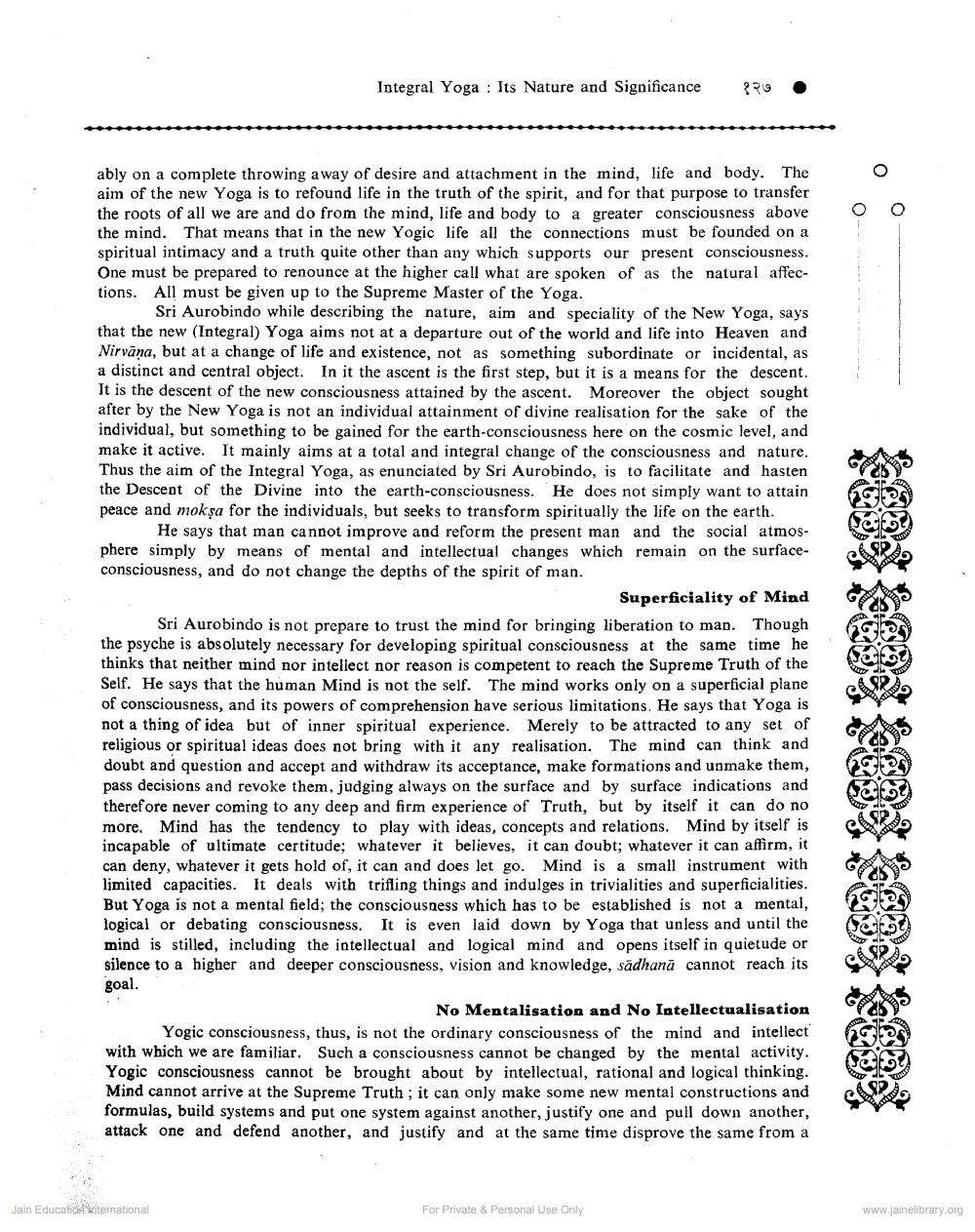Book Title: Integral Yoga Its Nature and Significance Author(s): G N Joshi Publisher: Z_Pushkarmuni_Abhinandan_Granth_012012.pdf View full book textPage 7
________________ Integral Yoga : Its Nature and Significance 329 GA ably on a complete throwing a way of desire and attachment in the mind, life and body. The aim of the new Yoga is to refound life in the truth of the spirit, and for that purpose to transfer the roots of all we are and do from the mind, life and body to a greater consciousness above the mind. That means that in the new Yogic life all the connections must be founded on a spiritual intimacy and a truth quite other than any which supports our present consciousness. One must be prepared to renounce at the higher call what are spoken of as the natural affections. All must be given up to the Supreme Master of the Yoga. Sri Aurobindo while describing the nature, aim and speciality of the New Yoga, says that the new (Integral) Yoga aims not at a departure out of the world and life into Heaven and Nirvana, but at a change of life and existence, not as something subordinate or incidental, as a distinct and central object. In it the ascent is the first step, but it is a means for the descent. It is the descent of the new consciousness attained by the ascent. Moreover the object sought after by the New Yoga is not an individual attainment of divine realisation for the sake of the individual, but something to be gained for the earth-consciousness here on the cosmic level, and make it active. It mainly aims at a total and integral change of the consciousness and nature. Thus the aim of the Integral Yoga, as enunciated by Sri Aurobindo, is to facilitate and hasten the Descent of the Divine into the earth-consciousness. He does not simply want to attain peace and mokşa for the individuals, but seeks to transform spiritually the life on the earth. He says that man cannot improve and reform the present man and the social atmosphere simply by means of mental and intellectual changes which remain on the surfaceconsciousness, and do not change the depths of the spirit of man. Superficiality of Mind Sri Aurobindo is not prepare to trust the mind for bringing liberation to man. Though the psyche is absolutely necessary for developing spiritual consciousness at the same time he thinks that neither mind nor intellect nor reason is competent to reach the Supreme Truth of the Self. He says that the human Mind is not the self. The mind works only on a superficial plane of consciousness, and its powers of comprehension have serious limitations. He says that Yoga is not a thing of idea but of inner spiritual experience. Merely to be attracted to any set of religious or spiritual ideas does not bring with it any realisation. The mind can think and doubt and question and accept and withdraw its acceptance, make formations and upmake them, pass decisions and revoke them, judging always on the surface and by surface indications and therefore never coming to any deep and firm experience of Truth, but by itself it can do no more. Mind has the tendency to play with ideas, concepts and relations. Mind by itself is incapable of ultimate certitude; whatever it believes, it can doubt; whatever it can affirm, it can deny, whatever it gets hold of, it can and does let go. Mind is a small instrument with limited capacities. It deals with trifling things and indulges in trivialities and superficialities. But Yoga is not a mental field; the consciousness which has to be established is not a mental, logical or debating consciousness. It is even laid down by Yoga that unless and until the mind is stilled, including the intellectual and logical mind and opens itself in quietude or silence to a higher and deeper consciousness, vision and knowledge, sādhanā cannot reach its goal. No Mentalisation and No Intellectualisation Yogic consciousness, thus, is not the ordinary consciousness of the mind and intellect with which we are familiar. Such a consciousness cannot be changed by the mental activity. Yogic consciousness cannot be brought about by intellectual, rational and logical thinking. Mind cannot arrive at the Supreme Truth, it can only make some new mental constructions and formulas, build systems and put one system against another, justify one and pull down another, attack one and defend another, and justify and at the same time disprove the same from a Jain Education International For Private & Personal Use Only www.jainelibrary.orgPage Navigation
1 ... 5 6 7 8 9 10 11 12 13 14 15 16
